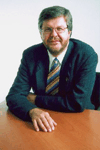Information technology needs to go beyond the latest youth-oriented web-based device and be used to assist elderly people in an ageing population, according to German IT expert Professor Dieter Rombach.
 In his Sydney Ideas lecture, to be held at the University of Sydney on Tuesday 11 September, Professor Rombach, executive and founding director of the Fraunhofer Institute for Experimental Software Engineering, will explore cutting-edge technologies that can be used to improve the lives of the aged and prolong their independence. “People are living longer,” says Professor Rombach. “The age pyramid is changing.”
In his Sydney Ideas lecture, to be held at the University of Sydney on Tuesday 11 September, Professor Rombach, executive and founding director of the Fraunhofer Institute for Experimental Software Engineering, will explore cutting-edge technologies that can be used to improve the lives of the aged and prolong their independence. “People are living longer,” says Professor Rombach. “The age pyramid is changing.”
Dr Rombach has been instrumental in the formation of an “Assisted Living Lab”, which opened last year at the Fraunhofer Institute. The lab, which looks like a regular apartment, is fitted out with the latest sensor and “Ambient Intelligence” technology to provide people in need of care with a degree of independence.
Practical uses of the technology include an “intelligent” refrigerator that monitors the expiration dates of the fridge’s contents plus an “intelligent” walking stick that actively reports when it is dropped indicating the person using it might have fallen.
In his Sydney lecture titled, “Everyday Living: the Impact of Information Technology”, Dr Rombach will discuss his latest work with assisted living and the application potentials for his research.
Professor Rombach will be introduced to the Sydney Ideas stage by Associate Professor Judy Kay from the University of Sydney’s School of Information Technologies. This Sydney Ideas lecture is part of the two-day GerMANY Innovations program at the University of Sydney and is a free event.
Dr H Dieter Rombach is a Full Professor in the Department of Computer Science at the University of Kaiserslautern and the founding director of the Fraunhofer Institute for Experimental Software Engineering, which aims to shorten the time needed to transfer research technologies into industrial practice. He has held faculty positions with the Computer Science Department at the University of Maryland in the USA, and in 1990 received the prestigious Presidential Young Investigator Award ($US500,000) from the US’s National Science Foundation in recognition of his research accomplishments in software engineering. He now heads several research projects funded by the German Government, the European Union and industry.
Source: University of Sydney
